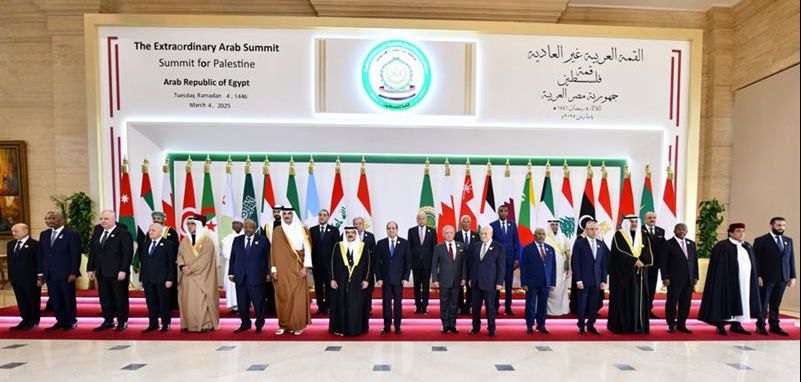 Photo: AFP
Photo: AFP
The Extraordinary Arab Summit held in Cairo on Tuesday reasserted the united Arab position, rejecting any displacement of the Palestinian people, whether from Gaza or the West Bank, while supporting Egypt's Gaza reconstruction plan and calling for an international conference to recognize Palestinian statehood, Al Ahram reports.
In their final summit declaration, Arab leaders reiterated their commitment to a just and comprehensive peace, ensuring the legitimate rights of all peoples—especially Palestinians—through an independent, sovereign state based on the 2002 Arab Peace Initiative. They condemned Israel's continued rejection of peaceful solutions.
They rejected all forms of violence, extremism, and terrorism, emphasizing that cooperation with international powers, including the UN and the US, remains essential for achieving lasting peace in the Middle East.
The leaders also reaffirmed their support for resolving conflicts through international negotiations, insisting on Palestinian statehood along the 1967 borders with East Jerusalem as its capital. (Tunisia and Iraq, however, maintain their non-recognition of Israel.) Additionally, they called for an international conference to recognize Palestinian statehood formally.
The final communique denounced Israeli policies aimed at altering Palestinian demographics, labelling them violations of international law and crimes against humanity.
They also condemned Israel's recent blockade of humanitarian aid to Gaza, calling it a breach of the ceasefire agreement, international law, and the Fourth Geneva Convention. The blockade was described as a deliberate use of starvation as a weapon and an attack on civilians for political purposes.
Warning against any attempt to displace Palestinians or annex their land forcibly, Arab leaders stressed that such actions would fuel prolonged conflict, destabilize the region, and undermine peace efforts. They acknowledged ongoing efforts by Egypt and Jordan to counter these threats.
The Arab nations emphasized that the immediate priority is enforcing the ceasefire agreement, particularly its second and third phases. These include Israel's complete withdrawal from Gaza, an end to hostilities—including from the Philadelphi (Salah El-Din) Corridor—and the unrestricted entry of humanitarian aid, including medical supplies. Aid must be distributed across all areas of Gaza, and displaced residents must be allowed to return home without obstacles.
The ceasefire agreement, brokered by Egypt and Qatar with US support, also includes the exchange of hostages and detainees. Efforts are underway to integrate the deal into a broader peace initiative.
Following the cessation of hostilities, an international conference on Gaza's reconstruction will be held in Cairo, with participation from the Palestinian Authority, the UN, and the international community.
A dedicated trust fund, backed by financial commitments from donor countries and institutions, will finance rebuilding projects to restore Gaza after the devastation caused by Israeli aggression.
Arab leaders urged the UN Security Council to deploy international peacekeeping forces to maintain security between Palestinian and Israeli populations in Gaza and the West Bank—an essential step toward establishing a Palestinian state.
The summit strongly condemned ongoing Israeli aggression in the occupied West Bank and violations of sacred sites, particularly in Jerusalem. Leaders emphasized the need for legal protection of Islamic and Christian holy sites in occupied Jerusalem, reaffirming the vital role of the Jerusalem Awqaf Administration in overseeing Al-Aqsa Mosque, in line with historical and legal precedents.
The Arab Summit, in coordination with the UN, called for launching an international fund to support Palestinian orphans in Gaza since there are over 40,000 children who have lost their parents due to Israeli aggression.
The summit has also mandated Arab legal bodies to study the classification of Israel’s forced displacement of Palestinians as a crime of genocide under the 1948 Convention on the Prevention and Punishment of Genocide.
The summit reaffirmed the necessity of fully implementing all provisions of UN Security Council Resolution 1701, particularly in condemning Israeli violations and ensuring Israel’s complete withdrawal from all recognized Lebanese territories.
It also condemned Israeli attacks on Syrian territory, considering them a blatant violation of international law and Syrian sovereignty, and warned that such actions escalate tensions and threaten regional stability.
The summit urged the United Nations Security Council to act against these violations, and it reaffirmed Syria’s right to reclaim its occupied territories, notably the Golan Heights, as per the 1974 Disengagement Agreement.
read more in our Telegram-channel https://t.me/The_International_Affairs

 9:44 08.03.2025 •
9:44 08.03.2025 •






















